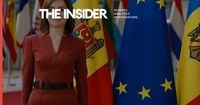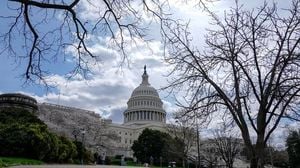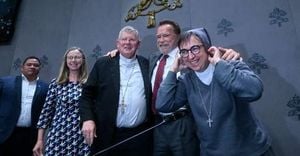On September 28, 2025, Moldova found itself at the center of Europe’s attention as parliamentary elections unfolded amid high stakes, fierce foreign meddling, and the country’s ongoing push toward European Union membership. The outcome, widely watched in neighboring Ukraine and particularly in the Odesa region, has not only reshaped Moldova’s domestic politics but also reinforced its pro-European trajectory in the face of persistent Russian interference.
The ruling Party of Action and Solidarity (PAS), founded by incumbent President Maia Sandu, emerged victorious, securing 55 out of 101 seats in parliament. While this tally is slightly fewer than in the previous legislature, it is still enough for PAS to govern without forming a coalition. The pro-Russian Patriotic Bloc finished a distant second, claiming 26 seats, while three other parties—the Alternative electoral bloc, Our Party, and the Democracy at Home Party (PPDA)—rounded out the new parliament. The PAS’s win grants it the ability to pass legislation independently, a crucial advantage as Moldova races to harmonize its laws with EU norms.
President Sandu, who has led Moldova since December 2020, was clear about the significance of this victory. Speaking after the results were announced, she affirmed, “We want to join the European Union in one step, as a reintegrated country. But if that is not possible—you know Russia illegally maintains troops on Moldova’s territory, and this is the biggest obstacle—then there is a scenario for accession in two steps.” According to The Insider, Sandu’s remarks underscore the enduring challenge posed by the approximately 1,500 Russian “peacekeepers” stationed in the breakaway region of Transnistria, whose presence continues to complicate Moldova’s EU ambitions.
The journey toward European integration has been anything but smooth. Following Russia’s full-scale invasion of Ukraine in March 2022, Moldova formally applied for EU membership. The European Council granted candidate status in June 2022 and, by December 2023, had announced the start of accession negotiations. In a bid to cement the country’s Western orientation, a national referendum was held on October 20, 2024, alongside the presidential election, proposing a constitutional amendment to enshrine EU membership as a national goal. Moldova has set an ambitious target of joining the EU by 2030, and the recent elections were widely seen as a referendum on this path.
Yet, the shadow of Russian interference has loomed large over Moldova’s democratic processes. As early as March 2024, the Moldovan Intelligence and Security Service (SIS) warned that Russia was planning steps to destabilize the country, seeking to derail its EU aspirations and restore Moscow’s influence. The warning was echoed by international partners: in July, U.S. Deputy Assistant Secretary of State Christopher Smith told Congress that Moldova’s elections represented a “historic opportunity” but faced significant Russian interference and disinformation.
These concerns proved prescient. According to BBC reporting, President Sandu revealed that Russia was preparing “unprecedented interference” in the run-up to the September 2025 parliamentary elections, including the transfer of about 100 million euros via cryptocurrency schemes to fund political projects and sow discord. The Kremlin, she said, was investing heavily in efforts to install its proxies in parliament, often through schemes linked to fugitive oligarch Ilan Shor, who was sentenced to 15 years in prison in Moldova.
Authorities responded with vigilance. In July 2025, the Central Election Commission (CEC) rejected the registration of the Peremoha bloc, citing its ties to Shor and the suspicious fact that its founding congress had been held in Moscow. The Victory Bloc, founded in April 2024 and comprising four Moldovan parties controlled by Shor, was similarly barred. These measures, while extraordinary, were deemed necessary by Moldovan officials. Historian and former diplomat Alexei Tulbure told The Insider, “In another context, such actions by the authorities might seem excessive, bordering on violating democratic principles. But in our case, it is defending democracy from attempts to destroy it. We realized how dangerous this was and began using extraordinary measures.”
The election campaign itself was marred by disinformation and attempts to manipulate public opinion, particularly among the Moldovan diaspora. Sandu accused Moscow of ramping up online propaganda, using Russian Orthodox priests and networks like Matryoshka bots to spread fake content. She claimed that in 2024 alone, Russia spent an amount equivalent to 1% of Moldova’s GDP on election interference. The tactics, she warned, were evolving, with Kremlin mercenaries even provoking riots in Moldovan prisons and staging fake bomb threats at polling stations abroad, notably in Germany.
On election night, the results were decisive. The PAS party not only retained a commanding lead but also ensured that the pro-European camp would set the legislative agenda. Five political forces entered parliament: PAS (50.20%), Patriotic Bloc (24.17%), Alternative electoral bloc (7.96%), Our Party (6.20%), and Democracy at Home (5.62%). The latter’s breakthrough was particularly notable; led by Vasile Costiuc, PPDA is a young right-wing party advocating for unification with Romania, reflecting Bucharest’s growing influence in Moldovan politics. According to Europa Liberă Moldova, Democracy at Home’s cooperation agreement with Romania’s right-wing AUR party further cements this cross-border political axis.
However, the aftermath was anything but tranquil. On September 29, after the CEC published the official results, Patriotic Bloc leader Igor Dodon refused to recognize PAS’s victory and called for protests. Demonstrations erupted in downtown Chisinau, leading to 31 detentions, most of them individuals from Transnistria. Moldovan police released interrogation videos showing detainees admitting they were paid between $50 and $150 to participate—another sign of the lengths to which external actors and their local proxies would go to disrupt the process. The Insider reported that many of the so-called “observers” present at the vote had previously participated in sham referendums in Russian-occupied Crimea and Donetsk, highlighting the international dimension of the disinformation campaign.
Despite these challenges, the message from voters was clear. As Tulbure put it, “The main result of the elections is that we withstood Russia and its agents’ assault on Moldova. We preserved our European course and our democracy.” The new parliament’s top priority is to bring Moldova’s legislation into compliance with EU standards—a task Tulbure described as a “legislative conveyor belt.” With a favorable international climate and the momentum of a clear electoral mandate, the country is closer than ever to achieving its European dream. “We are two steps away from EU membership, and such a favorable international climate for our accession may never come again. If we miss the chance today, it will be a tragedy for us, and Moldovans understood this,” he said.
The road ahead will not be easy. Russian troops remain on Moldovan soil, and the threat of foreign meddling is far from over. Yet, for now, Moldova’s voters have chosen a future anchored in Europe, determined to defend their fragile democracy against all odds.






